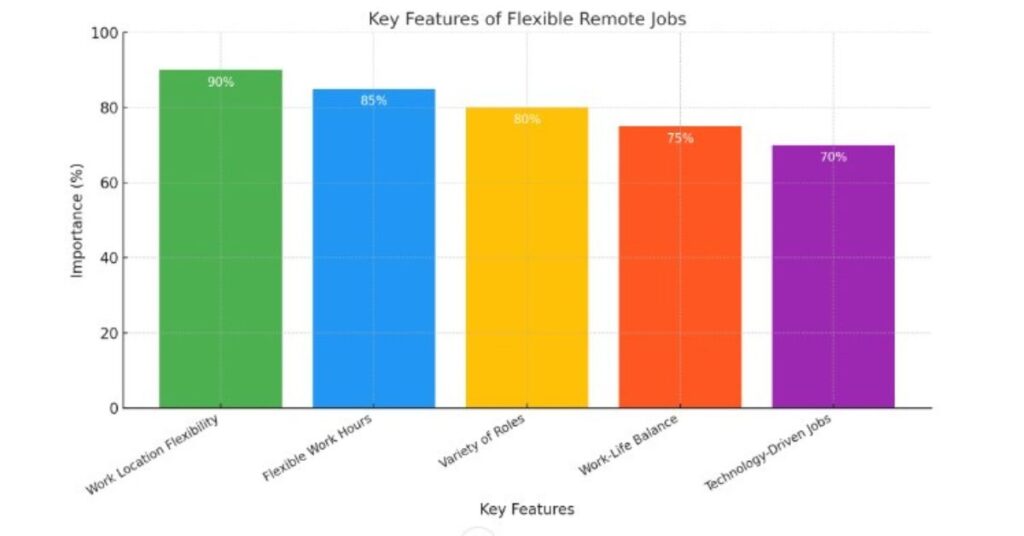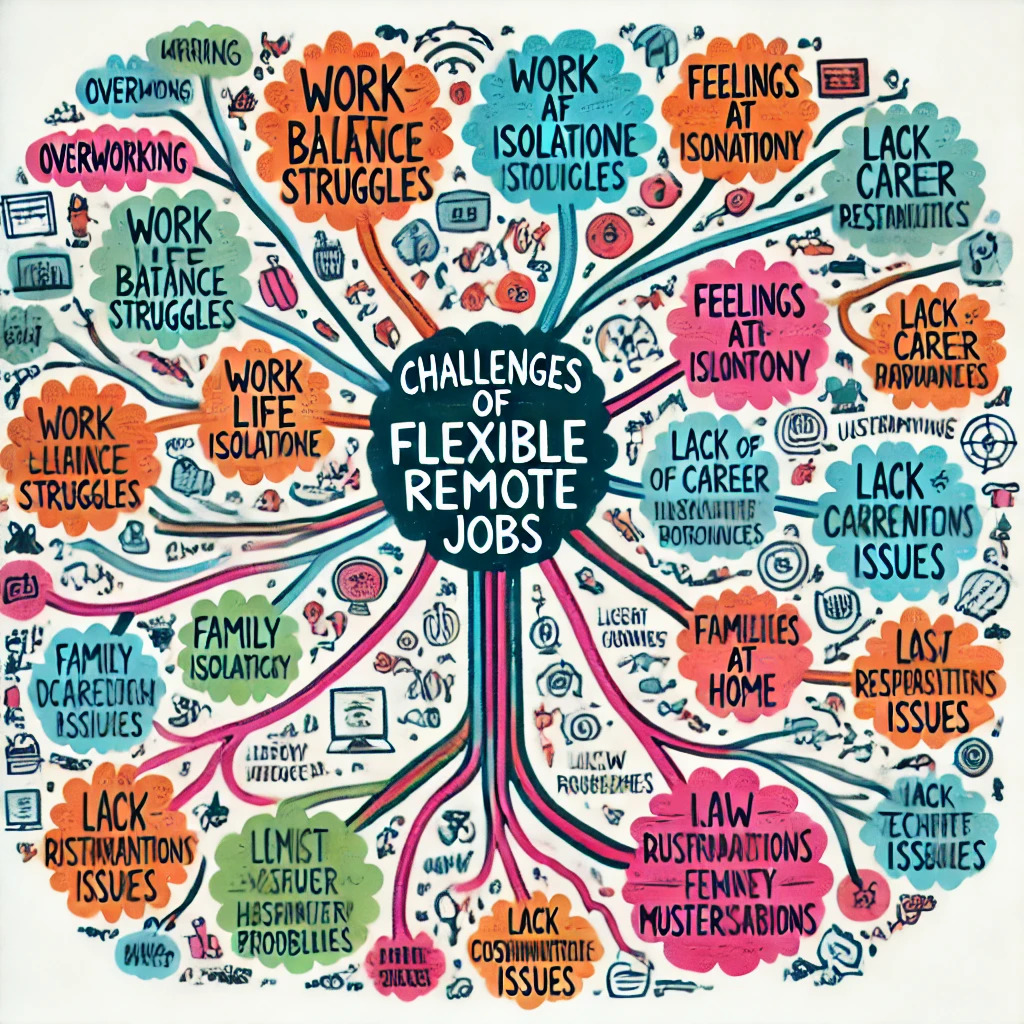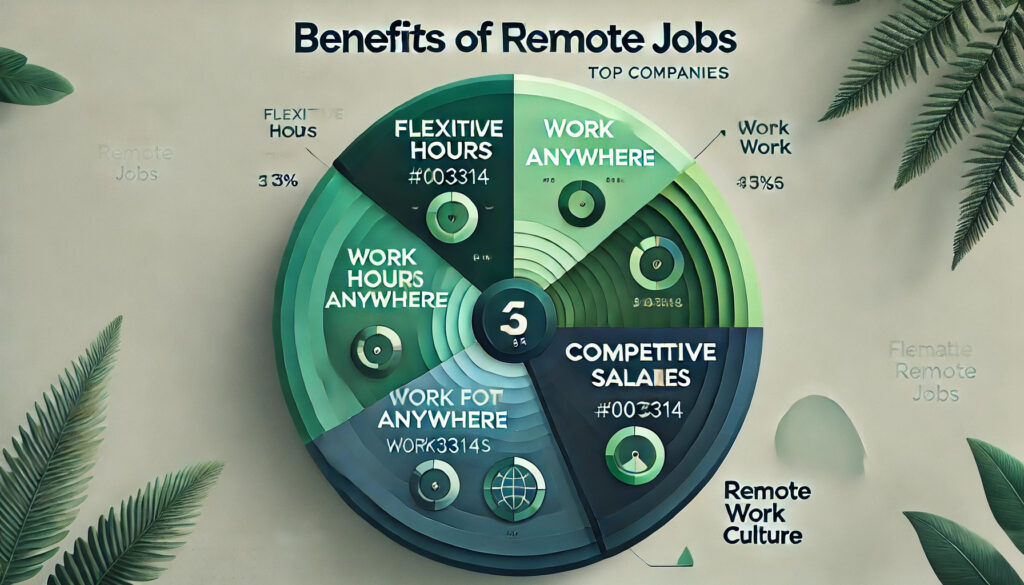
(Table of Content) If you have time, please read the entire article or click on your desired section
ToggleIntroduction to Flexible Remote Jobs:
Flexible remote jobs are reshaping the way people work.
Look at this statistic: According to a 2023 report by FlexJobs, remote work has surged by 159% over the past 10 years. This means that flexible job schedules are a top priority for job seekers.
Therefore, companies increasingly offer flexible remote work to attract top talent and retain employees.
These roles are ideal if you seek a better balance between work and personal life. Whether you’re looking for remote jobs with flexible hours or fully remote flexible jobs, the options are vast and varied.
For many, especially moms, flexible remote jobs for moms offer a chance to work while managing family responsibilities.
If you have a part-time remote job or a remote, flexible job, you’ll find plenty of opportunities – flexible job hours, work-life balance, etc. Many flexible jobs fit your needs even if you live in a place like Los Angeles or Utah.
Remote jobs often come with the added benefit of working from home. It makes life easier to stay productive while enjoying more freedom. Whether you’re looking for entry-level remote flexible jobs or remote work with flexible hours, there’s a role out there.
Companies like Berkeley also offer flexible work agreements, allowing employees more control over their work schedules.
As the demand for remote jobs with flexible schedules grows, big international companies hire employees worldwide.
Whether you’re searching for a fully remote flexible job or remote jobs with flexible schedules, you have many options to explore.
What are Flexible Remote Jobs?
Flexible remote jobs create work opportunities that allow you to complete tasks outside of a traditional office setting.
You can work from any place- personal workstation, home, garden, etc, where you feel comfortable. These jobs offer flexibility in terms of both types- part-time jobs and full time jobs, and work hours.

Key Features of Flexible Remote Jobs:
Flexible remote jobs create work opportunities that allow you to complete tasks outside a traditional office setting. You can work from any place- personal workstation, home, garden, etc, where you feel comfortable.
These jobs offer flexibility in terms of both types- part-time jobs and full time jobs, and work hours. Key features are given below:
Work Location Flexibility:
-
- You can work from anywhere (home, a café, or even while traveling).You don’t need to commute; it saves time and money.
Flexible Work Hours:
-
-
- You can choose your own working hours.
- You can set your schedule based on when you are most productive around the clock.
- You may have some roles that require core hours, while others demand entirely flexible hours.
-
Variety of Roles:
You will find many industries that offer full-time, part-time, and project-based flexible remote jobs, including:
- Customer service
- Data entry
- Marketing
- Writing
- Sales
Balance Between Work and Personal Life:
- Flexible Remote Jobs are perfect for those seeking a better work-life balance, such as parents, caregivers, or students.
- If you have flexible work schedules, you have an excellent opportunity to manage family responsibilities or personal tasks.
Technology-Driven Opportunities:
-
- These jobs are cloud-based. You can use different tools, video conferencing, and collaboration platforms to deliver your tasks.
Examples of Flexible Remote Jobs:
-
Remote Jobs with Flexible Hours:
- Some jobs allow you to choose when you start and finish your day. Job givers will give you the freedom to manage your commitments.
-
Fully Remote Flexible Jobs:
- These roles give you ultimate control over your schedule and work environment, but you are flexible regarding specific locations or set hours.
-
Part-Time Remote Jobs:
- If you are looking for a job requiring fewer hours per week, flexible part-time remote jobs are an excellent option.
Why Choose Flexible Remote Jobs?
| Improved Work-Life Balance |
| Increased Productivity |
| Attracting Global Talent |
With remote flexible jobs, the options are endless. Whether you’re looking for a part-time remote job, a fully remote flexible job, or a job that allows you to work at your own pace, there’s a perfect fit for everyone.
History of Flexible Remote Jobs:
As an idea, the word, flexible remote jobs, has evolved significantly over the past few decades. It started as an opportunity, but now it is a trend and demand for job seekers and givers. Let’s take a look at the history of the development:

Early Beginnings: 1980s to Early 2000s
Telecommuting is considered the first form of flexible work, and it was introduced in the 1980s. Large corporations like IBM initially popularized it. They allowed employees to work from home one or two days per week.
The rise of the internet in the late 1990s opened new opportunities for remote work. However, flexible remote jobs remained relatively rare during this time.
The Rise of Remote Work: 2000s to Early 2010s
The advent of broadband internet and cloud computing made it easier for employees to work from home. New advancements made it easier for employees to access office systems remotely.
During this time, for the first time, we saw the rise of virtual offices and fully remote flexible jobs.
By the early 2010s, many industries—including tech, marketing, and customer support—began offering remote flexible jobs.
Many companies started embracing the idea of flexible hours and locations, seeing the benefits of work-life balance and employee satisfaction.
Current Trends: 2015 to Present
After 2015, remote work transformed from a rare to a standard option for many companies. Flexible remote jobs became widely available across various fields, from entry-level positions to management roles.
Why the Shift?
The main reason behind the advancement of flexible remote jobs is Increased technology adoption. In addition, the rise of freelance and gig economy work has significantly expanded flexible work options.
As companies realize the benefits, such as cost savings and a happier, more productive workforce, the demand for remote flexible work will only grow.
Top 15 Benefits of Flexible Remote Jobs:
Flexible remote jobs have numerous benefits. From work-life balance to career growth, flexible jobs allow individuals to take control of their professional and personal lives. Here are the top 15 benefits of flexible remote jobs:

1. Better Work-Life Balance
Flexible remote jobs allow you to choose your work hours and place. You can align your work with other responsibilities – family time, hobbies, or personal self-care.
2. Cost Savings
Working at home saves you money from daily commuting, work attire, lunches, and other office-related expenses. You also can save time that can be used for other productive work, rest, recreation, and family enjoyment.
3. Higher Productivity
Studies have shown that employees in flexible remote jobs often have higher productivity than those working in traditional office settings. With a comfortable home environment, employees can focus on a particular given job, which can improve the organization’s results.
4. More Time for Family
These jobs are extraordinary for moms and caregivers. Flexible remote jobs for moms allow them to manage family duties while maintaining a career. This option is precious for those who need a part-time remote job or a job with flexible hours.
5. Global Job Opportunities
One of the best things about remote jobs with flexible schedules is that you have no boundaries; you are no longer limited by geography or borders.
You can apply for remote flexible jobs in Bangladesh from anywhere, even in cities like Los Angeles or Utah. It creates opportunities for you to access global talent pools and diverse roles.
6. Improved Health and Wellness
Flexible remote jobs allow you to avoid the stress of a long journey, often leading to better mental health. You also have more control over your daily schedule, enabling you to find time for exercise, meditation, or other wellness practices.
7. Career Growth and Opportunities
Many companies offer fully remote flexible jobs. They also provide ample opportunities for professional development. Whether you’re looking for entry-level remote flexible jobs or seeking more advanced positions, remote roles often offer room for growth.
8. Increased Autonomy
Remote work allows employees to manage their working hours and projects more independently. Therefore, flexible remote work often increases job satisfaction and creates more trust and empowerment.
9. Environmental Impact
For example, 20000 citizens live in a city and half work from home. What happened then? Flexible remote jobs can contribute to reducing carbon emissions and traffic congestion. Therefore, limited transportation can have a positive impact on the environment.
10. More Job Satisfaction
Many employees report higher job satisfaction with flexible remote work from home jobs. Since employees enjoy greater autonomy and a better balance between work and life, they are happier and more motivated.
11. Better Focus
In traditional office settings, many people work in a place; therefore, it can distract employees’ attention from the work frequently. However, employees have more control over their workspace in flexible remote jobs. It allows them to focus on their tasks.
12. Access to multiple Jobs
You will find different jobs on many platforms, from remote flexible part-time jobs to full-time roles. Whether you need a remote job with flexible hours or a fully flexible remote job, there are a lot of opportunities across various industries.
13. No Need for Commuting
With remote jobs flexible hours, you can say goodbye to long commutes. This saves time and money and reduces the stress and fatigue of daily travel.
14. Work from Anywhere
Whether at home, at a coffee shop, or while traveling, remote flexible jobs give you the freedom to work from anywhere. This location independence can be beautiful to digital nomads or people who prefer a flexible schedule remote job near me.
15. Increased Trust Between Employer and Employee
If employees do remote flexible work, they try to be more responsible to the authority. With the right tools and communication methods in place, remote teams thrive, building a sense of mutual respect and accountability.
Challenges of Flexible Remote Jobs:
While flexible remote jobs offer numerous advantages, they also present various challenges. Understanding and acknowledging these obstacles is not just about recognizing them, but also about empowering yourself to navigate the realities of remote work more effectively and manage your expectations with confidence.
Work-Life Balance Struggles
Setting your own hours is a key draw of flexible remote jobs. However, this freedom can sometimes blur the lines between work and personal life.
Without the structure of a traditional office, some find themselves working longer hours, while others struggle to switch off during the typical 9- 5. Yet, this challenge also presents an opportunity for personal growth and self-discipline, which can be a rewarding aspect of remote work.
Feelings of Isolation
Remote work can sometimes feel lonely, particularly when it’s a fully flexible remote job. To combat this, it’s important to schedule regular virtual meetings and online collaborations. These can’t completely replace the companionship of an office environment, but they can help you feel more connected.
Distractions at Home
Home offices may seem appealing, but they come with their own set of distractions. To manage this, it’s important to set up a dedicated workspace and communicate your work hours to your family.
For flexible remote jobs for moms, this challenge is often even more noticeable, as they must balance professional and domestic duties.
Lack of Career Advancement
While remote flexible jobs offer excellent flexibility in terms of flexible work hours, it’s important to be aware that they can sometimes limit career advancement in the long run.
You may stay behind from your promotions if you are not physically present at the office. Understanding this can help you plan your career path more effectively.
Communication Challenges
Effective communication can be a significant challenge in remote work. While tools like video conferencing, messaging apps, and email are helpful, they can’t fully replace the ease of in-person communication.
With team members spread across different time zones, misunderstandings and delays are more common. Recognizing these difficulties can help you feel less isolated in your communication struggles.
Technological Issues
A reliable internet connection and working devices are essential for remote flexible jobs. Any technical glitch or internet outage can disrupt your ability to work efficiently.
Moreover, only some have access to a fully equipped home office with high-speed internet, which can create disparities in work performance.
Overworking and Burnout
In remote jobs with flexible hours, it’s easy to fall into the trap of overworking. Research shows that strong blurred lines between work and personal life create huge pressure on productivity.
Many remote employees need a clear distinction between working hours and personal time to maintain a healthy work-life balance.
How to Find Flexible Remote Jobs?
Finding the right flexible remote job may seem frightening at the beginning. But if you follow the right approach, you can look for opportunities that align with your skills and lifestyle. I am describing here’s a step-by-step guide to help you get started:

Identify Your Desired Work Schedule and Type
Before diving into job searches, define what you want from a flexible remote job. Do you need remote jobs with flexible hours that allow you to adjust your schedule?
Or are you specifically looking for fully remote, flexible jobs that let you work from anywhere at any time? If you can understand your demands, that will help you to narrow down the search that fits your lifestyle.
Use Job Search Websites Specializing in Remote Work
Several websites circulate remote flexible job positions. These websites make it easier for you to find positions tailored to your needs. I am listing four websites here for you:
- FlexJobs – A reputable website that lists curated flexible remote jobs across various industries.
- We Work Remotely – A popular site for finding remote jobs flexible schedules, and remote flexible jobs for moms.
- Remote. Co – A great resource for fully remote flexible jobs with various categories and industries.
Make sure to use filters for remote, flexible jobs, part-time roles, and positions that offer flexible schedules to refine your search results.
Update Your Resume and Cover Letter Accordingly
When applying for remote jobs flexible, your cover letter and resume must ensure your ability to work:
- independently,
- manage time effectively, and
- adapt to different technologies.
For instance, job seekers will mention any experience with remote collaboration tools like Slack, Zoom, or project management software. As communication skills are crucial for remote work, you should emphasize it.
Search for Specific Flexible Jobs Based on Location and Industry
While flexible remote jobs offer the opportunity to work from anywhere, some employers may have location-specific requirements.
For example, if you live in Los Angeles or Utah, specific roles in those areas with flexible hours remote jobs might suit you. Use job boards to filter jobs by region to find local opportunities that still offer the flexibility you want.
Leverage Your Network
Networking plays a key role in discovering flexible remote jobs. Contact people in your industry through LinkedIn, Twitter, or other professional platforms.
You must join online communities and forums that are engaged with remote work to stay informed about openings. Online forums help you to connect with others who can assist you in finding a remote flexible job.
Check Company Career Pages
Many companies offer remote jobs with flexible schedules but may not list them on job boards. Look for companies that provide flexible remote work agreements, like Berkeley IT flexible work agreements, which allow employees to work from home or choose their hours.
Get Prepared for Remote Job Interviews
Once you’ve identified potential roles, it’s time to prepare for interviews. Employers who hire for remote flexible jobs look for candidates who can demonstrate reliability, communication skills, and the ability to manage tasks independently.
Practice how you would discuss your ability to manage time, handle distractions at home, and stay productive in a remote work environment.
Consider Freelancing and Contract Work
If you’re open to non-traditional employment, freelancing can provide the flexible remote work you seek.
Websites like Upwork, Freelancer, and Fiverr offer flexible, remote gigs in multiple fields. Freelancing allows you to set your schedule, choose the projects you want to work on, and work from anywhere.
The job search for flexible remote jobs may take time, but with persistence and the right strategy, you can find a role that allows you to enjoy the freedom and balance you seek.
Whether you’re looking for part-time remote jobs with flexible schedules, remote jobs that are flexible, or fully remote flexible jobs, opportunities are abundant if you know where to look.
Top 10 Companies in the USA Offering Flexible Remote Jobs:
If you are searching for a flexible remote job in the USA, you will find several companies that offer remote jobs with flexible schedules.
These companies provide excellent work-life balance and foster a positive remote work culture. Here are the top 10 companies you should consider:

Salesforce:
Salesforce is a leader in cloud-based software and services. They are well-known for offering remote flexible jobs. They also allow employees to work from anywhere while maintaining high productivity.
The company provides roles in various fields, including remote sales jobs, marketing, engineering, and customer support.
- Why Choose Salesforce: Flexible schedules, competitive salaries, and a commitment to diversity and inclusion.
GitHub:
GitHub is a platform for software development and version control. It has a fully remote team and offers flexible remote jobs in development, design, and operations. GitHub encourages a flexible working environment with employees able to choose their working hours.
- Why Choose GitHub: Freedom to work from anywhere, strong focus on work-life balance, and opportunities for personal growth.
HubSpot:
HubSpot, a leading inbound marketing and sales platform, has embraced remote flexible work for its employees. The company offers various remote jobs with flexible hours, ranging from customer success to content creation, marketing, and engineering.
- Why Choose HubSpot: Transparent culture, excellent employee benefits, and an emphasis on remote work flexibility.
Automatic:
Automatics, the parent company of WordPress.com, has a 100% remote workforce. They offer fully remote flexible jobs in engineering, design, marketing, and support.
Automatic employees enjoy the freedom to create their schedules, making it a top choice for those seeking remote jobs with flexible schedules.
- Why Choose Automatic: Fully remote work culture, flexible hours, and unlimited time off.
Dell Technologies:
Dell has long been known for offering flexible remote jobs, particularly in sales, customer support, and IT roles. The company allows employees to work from home or a hybrid arrangement, allowing for a balance between personal and professional life.
- Why Choose Dell: There is a wide range of flexible remote work options, excellent benefits, and a focus on diversity and inclusion.
Trello (Atlassian):
Trello, owned by Atlassian, is a popular project management tool that offers remote flexible jobs. Trello embraces flexibility, offering employees the opportunity to work from anywhere. The company hires for various roles, including software engineering, product management, and marketing.
- Why Choose Trello: A great remote work culture, ample growth opportunities, and flexible hours to maintain a healthy work-life balance.
Zapier:
Zapier, an automation tool for integrating apps and workflows, has a completely remote team spread across various locations. They offer remote flexible jobs in engineering, marketing, and customer support, all of which allow employees to work at their convenience.
- Why Choose Zapier: Fully remote, flexible hours, and focused on personal growth and development.
Buffer:
Buffer is a social media management company that offers remote flexible jobs. With a remote-first culture, Buffer allows employees to work from anywhere in the world. They hire for engineering, marketing, and customer success roles, among others.
- Why Choose Buffer: Remote-first company emphasizing Employee well-being and generous vacation policies.
LinkedIn:
LinkedIn, the world’s largest professional network, offers remote flexible jobs across various fields, including recruitment, marketing, and software engineering. The company’s flexible remote work arrangements allow employees to set their schedules, contributing to a better work-life balance.
- Why Choose LinkedIn: Excellent career advancement opportunities, great work culture, and flexible remote options.
Aetna:
Aetna, a health insurance company, offers numerous remote flexible jobs in healthcare, claims processing, and customer service. Many positions allow employees to work remotely with flexible schedules, providing the opportunity to balance work with personal commitments.
- Why Choose Aetna: Competitive pay, flexible work arrangements, and an inclusive company culture.
The demand for flexible remote jobs continues to grow, and these top companies are leading the way in offering remote jobs with flexible hours and fully remote flexible jobs.
Whether you’re seeking a part-time remote job with flexible hours or a full-time flexible remote job, these companies provide the opportunities and support to help you achieve a balanced work-life schedule.
DIY Techniques to Perform Outstanding in Flexible Remote Jobs:
Achieving success in a flexible remote job requires a combination of self-discipline, effective time management, and the right mindset.
While you work remotely, you are achieving unparalleled flexibility; it also demands high accountability and organization. Here are some DIY techniques you can use to perform at your best in flexible remote jobs:

- Set Goals and Prioritize Tasks
One of the biggest challenges of flexible remote work is staying organized. To avoid distractions, set clear goals and prioritize your daily tasks. You can track your progress using task management tools like Trello or Asana. This way, you’ll know what needs to be done and when.
Tip: Break large tasks into smaller chunks to finish them on time.
- Create a Dedicated Workspace
If you want to perform the best in the flexible remote job situation, you need a dedicated workspace – a home office, a corner of your living room, or a co-working space.
Tip: Ensure your workspace is free from distractions and has all the necessary tools, such as a comfortable chair, good lighting, and a stable internet connection.
- Stick to a Routine
While flexible remote jobs allow you to work at your own pace, maintaining a routine is vital. Start your day at the same time every day, and set specific hours when you’re most productive. Following a routine creates structure and helps you get into a productive flow, even when working from home.
Tip: You can use techniques like the Pomodoro Technique to balance your work with short breaks, which helps maintain focus over long periods.
- Communicate Effectively with Your Team
In flexible remote jobs, communication can sometimes be overlooked. However, it’s crucial to stay in touch with your team, managers, and clients regularly. Use collaboration tools like Slack, Zoom, or Microsoft Teams to keep communication flowing and ensure you’re aligned on tasks and goals.
Tip: Schedule regular check-ins and updates with your team to stay connected and clarify any doubts you may have.
- Embrace Technology and Tools
Take full advantage of the technology at your disposal. From project management tools to time tracking software, many tools are designed to help you manage your remote flexible job more effectively. These tools can help streamline work, track deadlines, and stay organized.
Tip: Explore tools like Google Drive, Slack, or Notion to improve workflow and collaboration with colleagues.
- Maintain Work-Life Balance
One of the main attractions of flexible remote jobs is the opportunity to maintain a better work-life balance. However, without boundaries, it’s easy to overwork yourself. Establish clear work hours and take regular breaks to avoid burnout.
Tip: Set boundaries with family and friends to ensure uninterrupted work time, and create a wind-down routine at the end of each workday.
- Stay Organized with Digital Files
Being organized is critical for remote work. Keep your digital files organized in clearly labeled folders and back them up regularly. This way, you can avoid wasting time searching for documents and ensure you never lose important work.
Tip: Use cloud-based storage solutions like Google Drive or Dropbox for easy access and backup of important files.
- Continuously Improve Your Skills
It’s essential to keep learning and developing new skills to stand out in a flexible remote job. Whether taking online courses or reading industry blogs, investing in your professional growth will help you stay competitive and excel in your career.
Tip: Set aside time each week for personal development, and use free resources like Coursera or LinkedIn Learning to expand your skill set.
- Stay Healthy and Active
Maintaining physical and mental health is important when working remotely. Sitting for long hours can lead to fatigue and health problems.
To stay energized and productive, incorporate physical activity into your day, whether stretching, yoga, or taking short walks.
Tip: Follow a fitness routine that works for you, and remember to take breaks to stretch and move your body throughout the day.
- Get Feedback and Adjust
In remote flexible jobs, it’s easy to feel isolated. One way to ensure you’re performing well is to seek feedback from your manager and colleagues. Regularly ask for constructive criticism, and be open to making adjustments based on that feedback.
Tip: Regular self-reflection and feedback can help you identify areas for improvement and keep your work performance on track.
By implementing these DIY techniques, you’ll not only improve your productivity in flexible remote jobs, but you’ll also be able to create a more balanced and fulfilling work experience.
Remember, remote work requires discipline, effective communication, and continuous learning. The more effort you put into creating a structured and healthy work environment, the more likely you will thrive in your flexible remote job.
Technological Tools for Flexible Remote Jobs:
Technology makes remote work more efficient, organized, and productive in flexible remote jobs.
Using the right tools allows you to stay connected, manage tasks, and collaborate seamlessly, regardless of where you work. Here are some of the essential technological tools for those in remote flexible jobs:
1. Communication Tools
Effective communication is vital in any flexible remote job. Without face-to-face interaction, you rely on digital tools to stay in touch with your team, managers, and clients.
The convenience of these tools can bring a sense of ease to your remote work. Here are some of the most popular communication tools:
| Tool | Description | Key Features |
| Slack | A messaging app for instant team communication. | Quick messaging, file sharing, project-specific channels. |
| Zoom | A video conferencing tool for virtual meetings and collaborations. | Screen sharing, recording, presentations. |
| Microsoft Teams | A communication tool integrated with Microsoft Office 365 for seamless collaboration. | Group chats, video meetings, file sharing, Office tools integration. |
Tip: Choose communication tools based on your team’s needs and the level of interaction required in your flexible remote job.
2. Project Management Tools
Keeping track of multiple projects and deadlines can be challenging in remote, flexible jobs, especially when working from different locations. Project management tools empower you to stay organized and keep your team aligned, giving you a sense of control over your work.
| Tool | Description | Key Features |
| Trello | A simple, visual tool that uses boards, lists, and cards to organize tasks and projects. | Boards, lists, cards, task organization for individuals/teams. |
| Asana | An advanced project management tool to track work, set deadlines, and collaborate on tasks. | To-do lists, task assignment, progress tracking. |
| Monday.com | A flexible work operating system for managing workflows, collaboration, and project progress. | Visual boards, automations, workflow management. |
Tip: If you work in a flexible remote job that requires collaboration with others, project management tools are essential for maintaining clarity and accountability.
3. Time Tracking Tools
In remote flexible jobs, it can be easy to lose track of time, especially if you’re balancing work and personal responsibilities. Time tracking tools can help you monitor your time on each task and ensure you stay productive.
| Tool | Description | Key Features |
| Toggl | A popular time tracking tool ideal for monitoring work hours, especially for freelancers and remote jobs. | Time tracking, simple interface, suitable for freelancers. |
| Clockify | A free time tracking app that lets you track time, create reports, and analyze productivity. | Time tracking, reporting, integrations with Trello & Asana. |
| RescueTime | An automatic time tracking tool that analyzes how you spend your time on apps and websites. | App/website tracking, productivity insights, time analysis. |
Tip: Time tracking tools help you stay on top of deadlines, improve time management, and boost productivity in your flexible remote job.
4. Cloud Storage Tools
Cloud storage is essential for remote workers who need to store, access, and share files from anywhere. These tools offer secure storage solutions and make collaboration easy, even when working across different time zones.
| Tool | Description | Key Features |
| Google Drive | Store and access files from anywhere. | Cloud storage, real-time editing. |
| Dropbox | Simple tool for file sharing and storage. | Easy sharing, app integrations. |
| OneDrive | Microsoft’s storage solution for Office users. | Office integration, secure access. |
Tip: Choose a cloud storage tool that integrates with your other work tools to streamline document management in your flexible remote job.
5. Collaboration Tools
Collaboration is essential for flexible remote jobs where teams may be dispersed geographically. These tools help ensure everyone is on the same page and that work progresses smoothly.
| Tool | Description | Description |
| Google Workspace | Collaboration tools for editing and sharing files. | Real-time editing, Docs, Sheets, Slides. |
| Notion | All-in-one tool for writing, planning, and organizing. | Knowledge bases, task tracking, projects. |
| Miro | Visual collaboration for remote brainstorming. | Digital whiteboard, creative teamwork. |
Tip: Use collaboration tools that enable real-time editing and smooth communication, making team projects more efficient in your remote flexible job.
6. Cybersecurity Tools
When working remotely, especially in flexible remote jobs, ensuring the security of your data and devices is crucial. Cybersecurity tools provide:
- A safety net.
- Helping protect sensitive information from potential breaches or cyberattacks.
- Giving you a sense of safety in your work.
| Tool | Description | Key Features |
| LastPass | Securely stores and auto fills your passwords. | Password management, security. |
| NordVPN | Protects your connection and ensures privacy online. | VPN service, public Wi-Fi safety. |
| McAfee | Shields against malware, viruses, and online threats. | Antivirus, comprehensive protection. |
Tip: Invest in cybersecurity tools to keep your work and personal data safe while working remotely.
Therefore, the right technology can significantly impact your success in flexible remote jobs. To boost workflow and productivity, you must maintain:
- Effective communication,
- Project management,
- Time tracking,
- Cloud storage, and
- Collaboration tools.
These tools facilitate smooth teamwork and cybersecurity.
Legal and Compliance Considerations for Flexible Remote Jobs:
Working in flexible remote jobs requires understanding legal and compliance issues, including labour laws, taxes, and data protection. Whether you’re a full-time employee or an independent contractor, you must know these factors.

Labor Laws and Employee Rights
Empower yourself by understanding your rights as a remote worker, whether you’re a full-time employee or an independent contractor. Key aspects include:
- Minimum Wage and Overtime: Remote workers must be paid according to local wage laws, including overtime pay, if applicable. Ensure your job description clearly defines the pay structure.
- Paid Leave: In full-time remote flexible jobs, employees are often entitled to paid time off, sick leave, and healthcare benefits. Contractors typically don’t receive these benefits.
Tip: Know whether you’re classified as an employee or contractor to understand your rights and benefits.
Tax Considerations
Understanding your tax obligations can bring a sense of relief. Here are some common issues:
- Income Tax: You may need to pay income tax based on where you live, even if your employer is in a different state or country. It’s important to understand tax laws for remote flexible jobs in your location.
- Self-Employment Tax: Independent contractors must pay self-employment tax. This includes both Social Security and Medicare taxes.
- State-Specific Rules: Some states have unique tax laws for remote workers, especially if you work from home in a different state than your employer.
Tip: Consult a tax professional to ensure compliance with local and state tax laws.
Data Protection and Privacy
Adhering to data protection laws can provide a sense of security, especially when working with sensitive data in flexible remote jobs:
- GDPR: If working with clients in the EU, comply with the General Data Protection Regulation (GDPR), which governs personal data usage.
- CCPA: If you’re handling the personal data of California residents, follow the California Consumer Privacy Act (CCPA).
Tip: Always sign a non-disclosure agreement (NDA) to protect sensitive information.
Intellectual Property Rights
In remote flexible jobs, intellectual property (IP) laws can be a concern, especially in creative fields. Clarify whether the work you produce belongs to you or your employer.
Be aware of non-compete agreements, which prevent you from working for a competitor for a certain period after leaving your current job, and confidentiality agreements, which prohibit you from sharing certain information about your work.
Worker Classification: Employee vs. Contractor
Understanding your classification is crucial:
- Employees receive benefits like health insurance and paid leave but must follow company policies.
- Independent Contractors enjoy flexibility but are responsible for their own taxes and benefits.
Tip: Always clarify your role and responsibilities before starting a flexible remote job.
Understanding legal and compliance issues in flexible remote jobs not only ensures you avoid legal risks but also helps you make informed decisions about your work and protect your rights.
By staying informed about labour laws, taxes, and data protection regulations, you can focus on your work while staying legally protected.
Future Trends in Flexible Remote Jobs:
The demand for flexible remote jobs has seen a significant increase over the years, and this trend will likely keep growing. As both businesses and employees appreciate the advantages of remote work, a few key trends are taking shape.
Increased Adoption of Hybrid Models
Many companies adopt hybrid work models. These models mix remote work with in-office work, giving employees a flexible option. Workers can work remotely some days and come to the office for team meetings.
This setup helps those who want personal interaction and a good work-life balance.
Rise of Part-Time Remote Roles
More people prefer part-time remote jobs because they want flexible work options. Many employees prefer remote jobs with flexible hours to better handle personal commitments like childcare or education.
Emphasis on Employee Well-being
More companies are allowing remote work and focusing on employee well-being. Many companies now offer benefits like mental health days and wellness programs to help remote workers with their mental and physical health.
Technology and Automation Integration
The future of remote flexible jobs will depend greatly on technology and automation. Tools for managing projects, communicating, and collaborating will keep getting better.
This will make it easier for teams to work efficiently from anywhere. AI and machine learning will take on more routine tasks, giving remote workers extra time for creative work.
Global Talent Pool
As remote, flexible jobs become more common, employers can hire from anywhere globally. Companies are hiring people from different countries, which lets workers access remote flexible jobs with competitive salaries.
Case Study: How Zapier Masters Flexible Remote Jobs:
Zapier is a tech company based in Sunnyvale, California, founded in 2011. It is known for its automation tools that help businesses connect apps and improve workflows.
With a remote team of employees in over 40 countries, Zapier is a great example of flexible remote work.
The company has roles in software development, customer support, marketing, and operations, all done remotely.

Challenge
As Zapier grew, it faced challenges with a fully remote workforce. Coordinating work across different time zones was difficult.
The company also had to find ways to maintain teamwork and help employees balance their work and personal lives.
Creating a sense of belonging for employees who may never meet in person was essential.
Solution
To tackle these challenges, Zapier introduced several strategies:
- Flexible Work Hours: Employees can choose to work when they are most productive, no matter where they are.
- Asynchronous Communication: Tools like Slack and Zoom help teams work together without needing to be online at the same time.
- Work Environment Support: Zapier gives employees a stipend of $10,000 for setting up their home offices, making remote work easier.
- Employee Well-being Initiatives: The company holds regular virtual meetups and offers mental health support to create a caring work culture.
Results
These strategies produced great results. Employee satisfaction increased by 20%, and retention rates were much higher than industry averages. Productivity also improved, with teams facing fewer delays despite time zone differences.
Narrative from the CEO
“Flexible remote work isn’t just a perk; it’s part of our DNA,” said Wade Foster, CEO of Zapier. “It allows us to hire top talent around the world while giving our employees the freedom to balance their lives.”
Lessons Learned
Zapier’s shows the importance of trusting and empowering the team.
By embracing flexibility, they proved that productivity doesn’t require a strict 9-to-5 schedule. Clear communication tools like Slack and Zoom help bridge gaps.
A key takeaway is that when you invest in your employees’ well-being, they will invest back in your company’s success. Imagine a workplace where employees feel trusted, supported, and valued. This is how Zapier turned remote work into a successful environment.
What can we learn from this?
Whether you run a business or work remotely, trust, flexibility, and connection can change how you work.
Flexible Remote Job Interview Tips:
Getting ready for a flexible remote job interview needs different strategies than a standard interview. Employers want candidates who do well in remote environments, can adjust to flexible schedules, and communicate effectively online. Here’s how to do well in your interview:
Research the Company and Role
- Understand the company’s mission, values, and culture.
- Learn how they implement flexible remote work policies.
- Please familiarize yourself with their tools and technologies, such as Slack or Zoom.
Showcase Your Remote Skills
- Highlight your ability to manage time and work independently.
- Discuss your proficiency with digital tools like Trello, Asana, or Microsoft Teams.
- Share examples of how you’ve adapted to remote work environments.
- Prepare for Common Remote Job Questions
Be ready to answer questions like:
- “How do you manage distractions while working remotely?”
- “Can you describe a time when you worked successfully with a remote team?”
- “How do you ensure clear communication with colleagues across time zones?”
Create a Professional Virtual Setup
- Ensure a quiet and distraction-free environment.
- Use a well-lit space with a neutral background to maintain professionalism.
- Test your internet connection and interview software in advance.
Ask Thoughtful Questions
Show your interest by asking questions such as:
- “What communication tools does the team use?”
- “How does the company support work-life balance?”
- “What flexibility can I expect in this role?”
Interviews for flexible remote jobs are your chance to demonstrate how well you’ll fit into a dynamic work environment. Focus on confidence, preparation, and showcasing your adaptability.
Tips for Flexible Remote Job Policies and Best Practices:
It’s essential for companies that offer remote jobs to have clear remote work policies. These policies help keep workers productive, create a positive work culture, and ensure everyone follows the rules. Here are some key tips for making effective remote work policies:
Set Clear Expectations
- Define work hours and ensure flexibility. For example, if employees are in different time zones, allow them to choose when they start and end their workday.
- Clarify project deadlines, communication channels, and team meeting schedules.
Offer Flexible Communication Tools
- Provide a variety of communication platforms, such as email, Slack, or Microsoft Teams, to suit different communication styles.
- Ensure your team is comfortable with video conferencing tools like Zoom or Google Meet for regular check-ins and meetings.
Establish Accountability and Reporting
- Use project management tools like Trello, Asana, or Basecamp to track progress and keep everyone organized.
- Set clear expectations for performance and deliverables.
Encourage a Healthy Work-Life Balance
- Promote the importance of taking regular breaks and setting boundaries to prevent burnout.
- Allow for flexible schedules to help employees manage both personal and professional commitments.
Offer Opportunities for Growth and Development
- Encourage team members to continue learning by offering access to online courses or training programs.
- Create mentorship opportunities to help employees grow within the company while working remotely.
Provide IT and Security Support
- Ensure your team can access the right tools, software, and tech support to perform their roles effectively from home.
- Implement security protocols to protect company data, especially in remote flexible roles.
A clear remote work policy helps employees be flexible and feel supported while staying productive. By following these best practices, companies can create a smooth remote work environment where employees can succeed.
Tips for Health and Wellness in Flexible Remote Jobs:
Remote work offers many advantages, including flexibility in your schedule and the ability to work from the comfort of your home.
However, it also comes with unique challenges, especially in maintaining your health and well-being.
If you do not have a traditional office, neglecting your physical and mental health can be easy. Here are some tips to help you stay healthy and balanced while working a flexible remote job.
Create a Dedicated Workspace:
A designated workspace can ensure your health. It helps to separate your work life from personal time. Ensure your workspace is ergonomically friendly, with a comfortable chair, desk, and good lighting.
This will improve productivity and reduce physical strain, preventing back pain or discomfort.
Take Regular Breaks:
Sitting for long periods can lead to back pain, poor blood circulation, and mental fatigue. Schedule short breaks to stretch, walk, or step outside for fresh air. A quick 5-minute break every hour can significantly improve focus, well-being, and productivity.
Stay Active:
Incorporating physical activity into your day is crucial when working remotely. Whether it’s a workout before work, a midday yoga session, or a walk during lunch, staying active will keep your energy levels up and improve mental health.
You can also invest in standing desks or desk exercises to stay moving even while working.
Maintain a Healthy Diet:
When you work remotely, it can be tempting to snack constantly. Set regular meal times and prepare nutritious meals to maintain your energy throughout the day.
Healthy food choices can positively impact your mood, productivity, and overall health. Eating balanced meals is vital for sustaining focus in your remote job.
Mental Health Matters
Isolation and burnout are real concerns when working remotely. Make sure to stay connected with colleagues through virtual meetings or informal chats.
Consider mindfulness exercises or meditation to manage stress and maintain mental clarity. Prioritizing your mental well-being is essential to maintaining a successful flexible remote job.
Set Boundaries
One of the biggest challenges in remote work is maintaining a work-life balance. Establish clear boundaries between work hours and personal time. Avoid checking emails outside of work hours to reduce stress and burnout.
Get Enough Sleep
A consistent sleep schedule is essential for good health. Working from home means letting work spill into your personal time is easier, but rest is critical for performance and well-being. Aim for 7-9 hours of sleep each night to maintain productivity in your flexible remote job.
By following these simple yet effective tips, you can maintain your health and well-being while thriving in a flexible remote job. Remember, your well-being directly impacts your productivity, so prioritize it.
Remote Work Community and Networking Tips:
As flexible remote jobs become more common, networking within the remote work community is essential for your professional growth. Building connections can lead to new opportunities and help you stay engaged while working from home.
Join Online Communities: Platforms like Slack, LinkedIn, and Facebook groups offer great spaces for you to connect with other remote workers. Share your advice, ask questions, and stay updated on job leads that might benefit you.
Attend Virtual Networking Events: Participate in virtual conferences and webinars to meet industry leaders and fellow remote workers. These events provide valuable networking opportunities and insights into flexible remote jobs that can help you in your career.
Build Relationships with Coworkers: Combat isolation by scheduling regular virtual coffee breaks with your coworkers. This strengthens your remote team and helps you stay connected, making your work experience more enjoyable.
Use Social Media for Networking: Engage on platforms like LinkedIn and Twitter to connect with professionals in remote work. Sharing your own experiences can help you expand your network and learn from others.
Explore Job Boards and Marketplaces: Actively participate in platforms like FlexJobs and We Work Remotely to connect with others who are also seeking flexible remote jobs. This can open up collaboration opportunities for you.
By consistently engaging with these networks, you’ll not only strengthen your presence in the remote work community but also open doors to new possibilities for your career.
FAQ – Flexible Remote Jobs:
- What are flexible remote jobs? Flexible remote jobs allow employees to work from anywhere, often with flexible hours. These jobs provide the freedom to balance work and personal life while meeting professional goals.
- How do I find flexible remote jobs? Use job boards like FlexJobs, Indeed, and Remote.Co to find flexible remote jobs. Network online, optimize your LinkedIn profile and check company career pages for remote opportunities.
- Are flexible remote jobs part-time or full-time? Flexible remote jobs can be both part-time and full-time. You can choose based on your availability and preferences. Many companies offer flexible work schedules, allowing employees to work at their own pace.
- Can I work from anywhere with flexible remote jobs? Yes, most flexible remote jobs allow you to work from anywhere as long as you meet the company’s requirements. Some positions may have geographic restrictions or require specific time zones.
- What skills are required for flexible remote jobs? Flexible remote jobs require good communication, self-discipline, time management, and technical proficiency. Each job may require specific skills, depending on the role.
- How do flexible remote jobs benefit employers? Employers benefit from flexible remote jobs by attracting top talent, improving employee retention, and reducing office-related costs. Employees tend to be more productive and satisfied when they can work flexibly.
- Are flexible remote jobs legitimate? Yes, many reputable companies offer flexible remote jobs. Researching the company before applying is essential to ensure the job is legitimate. Be cautious of job scams.
- What are the challenges of flexible remote jobs? Challenges include potential isolation, difficulty managing time, and maintaining a work-life balance. However, many people overcome these challenges by setting boundaries and staying organized.
Conclusion:
Flexible remote jobs offer great opportunities. Many companies now embrace remote work, which offers flexibility in hours, location, and responsibilities.
For job seekers, the remote work community is growing. Networking helps you connect with potential employers. You can also use technological tools to find jobs.
The benefits of flexible remote jobs are clear. They improve work-life balance. You can work from anywhere. This freedom is essential for many people.
As demand for flexible remote jobs grows, employers will offer better policies and benefits and prioritize work-life balance and wellness initiatives.
You can find part-time remote jobs or full-time remote positions. The options are endless. To succeed, follow best practices. Keep improving your skills and build your network.
Take action now! Research companies are offering flexible remote jobs. Update your resume to highlight your remote skills. The future of work is flexible, and you can be part of it.
Sources:
Ardi, A., Cahyadi, H., Meilani, Y. F., & Pramono, R. (2024). Talent attraction through flexible work anytime from anywhere. Journal of Infrastructure, Policy and Development, 8(3), 2998. https://systems.enpress-publisher.com/index.php/jipd/article/view/2998
ȚARCĂ, N., & BUCUREAN, M. (2023). FLEXIBLE WORK. TRENDS AND PERSPECTIVES BASED ON LITERATURE INVESTIGATION. Annals of the University of Oradea, Economic Science Series, 32(2). https://openurl.ebsco.com
Van Heerden, R., & Naicker, V. N. V. (2024). An investigation into employee and organisational dynamics in a flexible work framework. EUREKA: Social and Humanities, (2), 3-15. https://journal.eu-jr.eu/social/article/view/3307
Shriniket Mishra, SS60-04 FLEXIBLE WORKING – A GREAT OPPORTUNITY TO ENHANCE HEALTH AND WELLBEING OF THE WORKFORCE, Occupational Medicine, Volume 74, Issue Supplement_1, July 2024, Page 0, https://doi.org/10.1093/occmed/kqae023.0352
Oksana, Kazak., Tetyana, Obelets. “6. Remote employment: a short-term strategy for adapting to the crisis or the new reality of human resource management.” Baltic Journal of Economic Studies, undefined (2022). doi: 10.30525/2256-0742/2022-8-2-98-104. http://baltijapublishing.lv/index.php/issue/article/view/1755
Author’s Bio
My Name is Salauddin Biswas. I hold a Master’s degree in History from the University of Dhaka, Bangladesh, and in Anthropology from the University of Heidelberg, Germany. With years of research experience, I have transitioned into a passionate Content Writer, AI Content Editor, SEO Specialist, and Data Operator.
Since 2012, I have served Fabrics World USA as a Content Creator and SEO Specialist. I am also a consultant of SA WEBSOFT. My goal is to ensure my clients are 100% satisfied, both in profitability and company growth. Combining my education and experience, I prioritize benefiting my customers.
My research tenure at Heidelberg University and BRAC University enhanced my analytical skills and understanding of human behavior, which I continuously apply to my work.
Visit Our Social Media:
✅ LinkedIn:
https://www.linkedin.com/in/salauddin-writer-seo-dataentry/
✅Facebook:
https://www.facebook.com/profile.php?id=61557149480263
✅ Instagram:
https://www.instagram.com/seoanddataentry/
✅ Twitter:
https://x.com/SalauddinB1980/
✅ Pinterest:
Link: https://www.pinterest.com/seoanddataentryhub/
✅ Youtube:
URL: https://www.youtube.com/channel/UCCP5sGmyvOw4fuyDkZVO_Sg
🚀 SEO, Content Writing Strategy and Creative Content: Writing: https://www.upwork.com/freelancers/~0178b287b0e055623e?mp_source=share


















